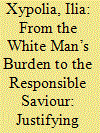| Srl | Item |
| 1 |
ID:
148650


|
|
|
|
|
| Summary/Abstract |
This essay draws on archival documents to explore the British Empire’s plans for establishing a university in the eastern Mediterranean in the 1930s. The British possessions in the region were at stake in the aftermath of the First World War. Since the early 1930s the Foreign Office had been eagerly planning the establishment of a university in the region in order to make the local elites familiar with Western culture. Egypt, Palestine, and Cyprus were considered the most likely locations for the institution. It is argued that cultural propaganda was perceived by the Foreign Office as an essential component of the empire’s strategy and legitimacy in its sphere of influence. Although the project was eventually not realized due to the outbreak of the Second World War, its significance lies in the demonstration of the British grand strategy in the eastern Mediterranean during the interwar period.
|
|
|
|
|
|
|
|
|
|
|
|
|
|
|
|
| 2 |
ID:
183762


|
|
|
|
|
| Summary/Abstract |
In recent years, there has been renewed interest in conceptualising the political nature of human rights as well as intense debate over the precise nature of Western biases in the whole project. Spurred by the fresh renewal of radical theory, a growing body of literature explores the role that racialized power hierarchies have played in the human rights project through the Responsibility to Protect Doctrine. Drawing from critical human rights scholarship, this article explores the way human rights have been employed as a legitimising discourse for justifying military intervention in Libya. In doing so, it illustrates the Eurocentric conceptualisation of power, power hierarchies and subjectivities.
|
|
|
|
|
|
|
|
|
|
|
|
|
|
|
|
| 3 |
ID:
183154


|
|
|
|
|
| Summary/Abstract |
The 1923 Treaty of Lausanne has been the most consequential treaty for the Eastern Mediterranean during the past century. It established the borders of the newly founded Republic of Turkey and defined its relations with Cyprus. Yet, a provision of the treaty has escaped scholarly scrutiny. This analysis explores the violation of Lausanne’s Article 21 that provided for emigration of Moslem Cypriots to Turkey by British Imperial officials in Cyprus. There are three significant issues about Moslem Cypriots acquiring Turkish citizenship. First, it demonstrated the newly formed Turkish Republic’s stance towards the Moslem community of the former Ottoman Empire. Second, it underlined the aspiration of a large portion of Moslem Cypriots to join newly formed Turkey. Third, and most important, it upheld British Imperial strategy on the island and the significance of the continuation of the existence of a Moslem minority. The value of the Lausanne treaty for Cyprus and the relationship between the British rule and the Moslem community of the island was paramount.
|
|
|
|
|
|
|
|
|
|
|
|
|
|
|
|